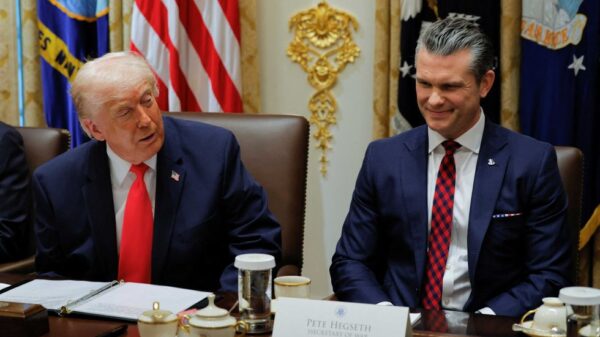UPDATE: Argentina’s economy is on the brink as President Javier Milei faces mounting pressure ahead of the critical October 26 midterm elections. With over 17,600 businesses shuttered, including 1,800 manufacturers, the impact of his austerity measures is palpable, leaving many workers in despair.
The factory floor that once thrived now echoes with silence at the Galfione Group textile mill in southern Buenos Aires. Owner Luciano Galfione reported a staggering 80% reduction in operations, forcing him to lay off half his workforce and dip into personal savings to keep the family-run business afloat. “We’re seeing an industry in crisis, and it’s about to go bankrupt,” he warned, highlighting the urgent plight of the textile sector.
As Argentina’s economy falters, the upcoming elections are viewed as a referendum on Milei’s radical policies. His government’s drastic cuts and free-market reforms have led to soaring unemployment, which recently hit 9.8% in Buenos Aires Province, up from 7.3% a year prior. Many voters are losing faith in Milei’s ability to bring about meaningful change.
The turmoil reached a boiling point when voters in the manufacturing belt of suburban Buenos Aires expressed their discontent, leading to a sharp sell-off of the peso. This prompted the Milei administration to scramble for $20 billion in financing from an unexpectedly supportive Trump administration. Trump’s recent remarks emphasized that this financial lifeline hinges on Milei’s electoral success, further complicating the situation for the beleaguered president.
“Just helping a great philosophy take over a great country,” Trump stated after meeting with Milei at the White House.
However, many Argentines, like Walter Willatt, a local newsstand owner, remain skeptical. “If the economy revives, it will have to be through domestic consumption,” he said, reflecting widespread frustration with the current state of affairs.
Once celebrated for his promise to tackle inflation, Milei now faces a barrage of criticism. Despite an initial decrease in inflation rates, the nation’s economic woes have escalated due to high import competition that undermines local manufacturing. The influx of cheaper products from abroad, particularly from Chinese e-commerce giants, has devastated local businesses, leaving them unable to compete.
As Milei continues to implement austerity measures, essential expenses for average Argentines have skyrocketed. With rising bus fares, utility costs, and healthcare expenses, many families are struggling to make ends meet. Rodolfo Núñez, a former factory worker who lost his job due to the economic downturn, lamented the hardships faced by his family, stating, “What Milei promised, he didn’t do.”
Consumer confidence has plummeted as households slash spending on non-essential items. Clothing sales alone dropped by 10.9% in September compared to the previous year, showcasing the distress felt across various sectors. As the crisis deepens, many manufacturers are left with no choice but to reduce costs drastically to survive.
Looking ahead, the pressure mounts on Milei to deliver tangible results before the elections. Voters are increasingly restless, demanding solutions that address job creation and economic growth. “There’s a new generation of demands,” warns Marcelo J. García, Director for the Americas at Horizon Engage. “I’m not sure that government is prepared to meet those demands.”
As the elections approach, the fate of Milei’s administration hangs in the balance. Will the promised financial aid from the U.S. be enough to turn the tide, or will Argentina’s economic crisis continue to spiral? Only time will tell, but for now, the urgency for change is unmistakable.







































































